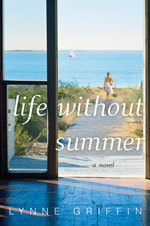 I've been a family life expert for more than twenty years, and there's so much about my work counseling women, teaching parents and observing children that inspired my first novel. Life Without Summer weaves together the lives of Tessa, a young mother who has lost her four-year-old daughter in a hit and run accident outside her preschool, and Celia, the grief counselor who tries to help her put her life back together. As Celia struggles to keep Tessa from getting caught up in a bleak crusade for answers, she finds that their sessions open the door to emotions she's spent years ignoring.
I've been a family life expert for more than twenty years, and there's so much about my work counseling women, teaching parents and observing children that inspired my first novel. Life Without Summer weaves together the lives of Tessa, a young mother who has lost her four-year-old daughter in a hit and run accident outside her preschool, and Celia, the grief counselor who tries to help her put her life back together. As Celia struggles to keep Tessa from getting caught up in a bleak crusade for answers, she finds that their sessions open the door to emotions she's spent years ignoring.As a parenting columnist and the author of a nonfiction parenting guide, Negotiation Generation, I always knew I would write a book about the different kinds of loss that affect parents, though I thought for sure it would be nonfiction. Then the idea for Life Without Summer came to me in its entirety, a story about two women who had experiences that echoed one another's. From day one, I knew the first line and the last line of the novel, and they've never changed. I also knew right from the beginning who was responsible for the chain of events leading up to the tragedy. Though it was a difficult character to assign the role to, I've never wavered in my commitment to tell the story as it came to me.
Many women turn to self-help books, and for them, there are a lot of wonderful resources about loss available. Yet some women look for solace in relating to fictional characters, ones who give voice to how they feel; who allow them to escape from their own pain and at the same time still feel connected. I've always sought out reading fiction for that purpose, and I guess I wanted to explore this type of loss without being prescriptive. With something as deeply personal as losing a child, I wanted to write my way to the heart of the experience. I believe Life Without Summer captures the authentic experience of grief, both the universal and personal aspects of it. Though I've never lost a child, I admit to being gripped by the fear it could happen to me. What ifs have been known to have their way with me. I've felt the foreboding a mother feels when her daughter sniffles, coughs, trips or falls. I understand the woman who panics when her son is late coming home from school.
Writing this story gave me the chance to explore the fears that plague mothers. In this fictional account of the very real experiences two women face when their parental identity is shaken and loss threatens to break up more than just one family, parents can learn so much about healthy coping, what it takes to live again after the death of a child. In truth, Life Without Summer started off as a portrait of two women whose lives converge unexpectedly after a tragedy, but it became so much more. It's about the choices people make when faced with unbelievable pain. It's about what really holds relationships together when they're tested. It's about the choice we all have to forgive.
As a counselor, I've always been struck by the healthy and unhealthy ways grief work gets done. As a novelist, I found a way to offer hope to others who may be afraid and to comfort those who know loss intimately. Readers ask me why the novel is told through Tessa's and Celia's journal entries. The act of journal writing has its roots in cognitive-behavioral counseling. When a counselor wants to encourage internal reflection, he or she often recommends writing down thoughts, feelings and actions. It gives the person journaling an outlet for intense emotion, and it gives them a chance to reflect later, on personal growth over time. I love to journal, and I've used it a great deal in my work with families, so I wasn't surprised that this was the way the story came to me. I chose it because it allowed me to give readers a very up close and personal account of the grief experience, from not one, but two different women's points of view.
Like the women in my novel, I've felt the incredible longing to be whole again after losing a loved one, to be the person I was before grief introduced herself to me. Whether you've experienced loss or know someone who has, I invite you to escape into a story that reverberates universal themes about the connections between love and marriage and truth and forgiveness. In Life Without Summer, the strongest message is that there is hope in healing.
---Lynne Griffin

